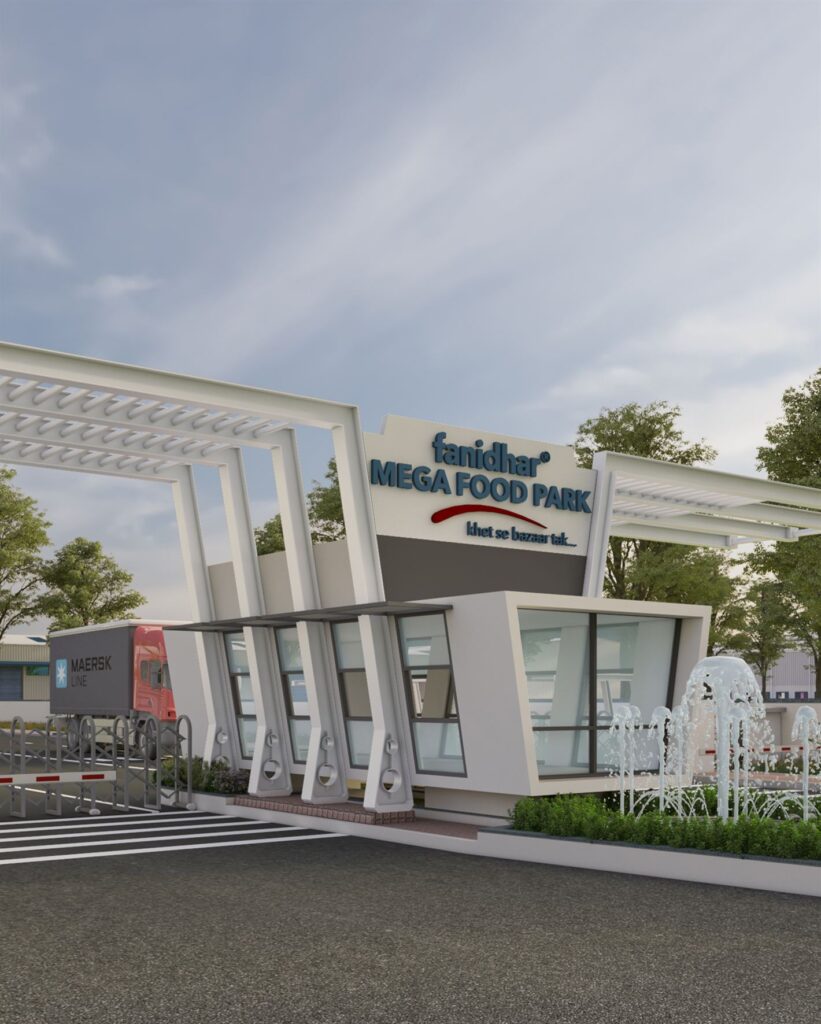Description
Fanidhar Mega Food Park: Transforming Agricultural Landscape
Fanidhar Mega Food Park, situated in Gujarat, India, represents a significant leap towards modernizing the agricultural and food processing sectors in the country. Developed under the Mega Food Parks Scheme by the Government of India, Fanidhar Mega Food Park is strategically located to harness the agricultural potential of the region while providing comprehensive infrastructure and facilities for food processing industries.
Strategic Location and Connectivity
Fanidhar Mega Food Park is located in the Banaskantha district of Gujarat, a region known for its fertile agricultural lands and diverse crop production. The park's proximity to major highways and transportation hubs facilitates seamless connectivity with key markets across India. This strategic location enhances accessibility for raw materials and distribution of processed food products, contributing to efficient supply chain management.
Development and Infrastructure
Integrated Infrastructure: The Mega Food Park spans over a substantial area, equipped with world-class infrastructure tailored to meet the needs of food processing industries. It features modern processing facilities, cold storage units, warehouses, packaging units, and quality control laboratories. These facilities enable food manufacturers to process, preserve, and package agricultural produce efficiently while maintaining high quality standards.
Value Addition: Fanidhar Mega Food Park focuses on value addition to agricultural produce, promoting crop diversification and reducing post-harvest losses. It offers farmers and food processors access to advanced technologies and machinery for sorting, grading, and processing various agricultural commodities such as fruits, vegetables, grains, and dairy products.
Economic Impact
Boost to Rural Economy: The establishment of Fanidhar Mega Food Park has had a profound impact on the local rural economy. By creating a market for farmers' produce and providing employment opportunities, the park has contributed to income generation and improved livelihoods in the region. Small and marginal farmers benefit from better prices for their produce, while skilled and unskilled laborers find employment in food processing units within the park.
Entrepreneurship and Investment: The Mega Food Park has attracted significant investments from both domestic and international food processing companies. This influx of capital not only strengthens the park's infrastructure but also fosters entrepreneurship and innovation in food processing technologies. The availability of modern facilities and supportive policies encourages entrepreneurs to set up food processing units, thereby promoting industrial growth and economic development.
Sustainability and Environmental Impact
Environmental Sustainability: Fanidhar Mega Food Park emphasizes sustainable practices in food processing and waste management. It promotes eco-friendly initiatives such as energy-efficient technologies, water conservation measures, and waste recycling systems. By adhering to stringent environmental regulations and implementing green technologies, the park minimizes its ecological footprint and contributes to environmental conservation.
Social Impact and Community Development
Skill Development: The Mega Food Park plays a crucial role in skill development by providing training programs in food processing techniques, quality control, and management. These initiatives enhance the employability of local residents, empowering them with specialized skills for careers in the food processing industry.
Social Infrastructure: In addition to industrial facilities, Fanidhar Mega Food Park includes amenities such as worker housing, healthcare centers, and educational institutions. These social infrastructure developments cater to the well-being and holistic development of the workforce and their families, ensuring a sustainable and inclusive growth model.
Government Support and Policy Framework
Mega Food Parks Scheme: Initiated by the Ministry of Food Processing Industries, Government of India, the Mega Food Parks Scheme aims to create efficient food processing infrastructure and promote value addition in agricultural produce. Fanidhar Mega Food Park is a flagship project under this scheme, receiving support and facilitation from central and state governments to streamline regulatory processes and provide financial assistance.
Policy Incentives: The establishment of Fanidhar Mega Food Park benefits from various policy incentives, including tax breaks, subsidies for infrastructure development, and customs duty exemptions on equipment. These incentives make it more attractive for investors and food processors to participate in the park's development and operations.
Future Prospects
Looking ahead, Fanidhar Mega Food Park is poised for continued growth and expansion. With ongoing investments in infrastructure, technology upgrades, and market expansion initiatives, the park aims to enhance its competitiveness on a global scale. Future developments may include diversification into new food processing segments, adoption of digital technologies for efficiency gains, and expansion of cold chain logistics to support perishable goods.
Conclusion
Fanidhar Mega Food Park stands as a transformative initiative in India's agricultural and food processing sectors. By leveraging strategic location, robust infrastructure, and sustainable practices, the park facilitates value addition to agricultural produce, boosts rural economies, and promotes industrial growth. As a catalyst for economic development and community empowerment, Fanidhar Mega Food Park exemplifies the potential of integrated food processing hubs in driving socio-economic progress and agricultural transformation.






